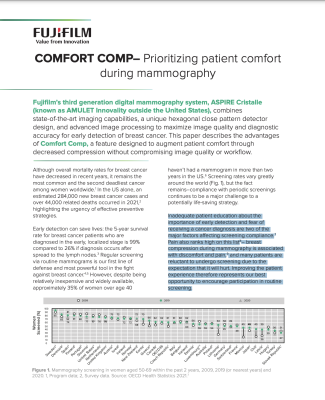
Fujifilm’s third generation digital mammography system, ASPIRE Cristalle (known as AMULET Innovality outside the United States), combines state-of-the-art imaging capabilities, a unique hexagonal close pattern detector design, and advanced image processing to maximize image quality and diagnostic accuracy for early detection of breast cancer. This paper describes the advantages of Comfort Comp, a feature designed to augment patient comfort through decreased compression without compromising image quality or workflow.
Although overall mortality rates for breast cancer have decreased in recent years, it remains the most common and the second deadliest cancer among women worldwide. In the US alone, an estimated 284,000 new breast cancer cases and over 44,000 related deaths occurred in 2021, highlighting the urgency of effective preventive strategies.
Early detection can save lives: the 5-year survival rate for breast cancer patients who are diagnosed in the early, localized stage is 99% compared to 26% if diagnosis occurs after spread to the lymph nodes. Regular screening via routine mammograms is our first line of defense and most powerful tool in the fight against breast cancer. However, despite being relatively inexpensive and widely available, approximately 35% of women over age 40 haven’t had a mammogram in more than two years in the US. Screening rates vary greatly around the world, but the fact remains–compliance with periodic screenings continues to be a major challenge to a potentially life-saving strategy.
Inadequate patient education about the importance of early detection and fear of receiving a cancer diagnosis are two of the major factors affecting screening compliance. Pain also ranks high on this list – breast compression during mammography is associated with discomfort and pain, and many patients are reluctant to undergo screening due to the expectation that it will hurt. Improving the patient experience therefore represents our best opportunity to encourage participation in routine screening.


 July 29, 2024
July 29, 2024 








